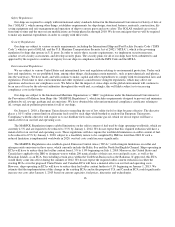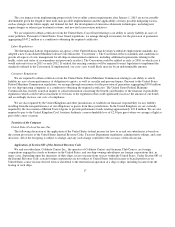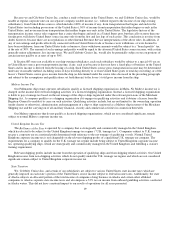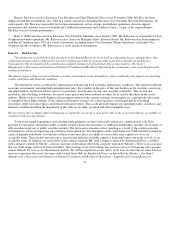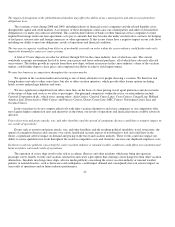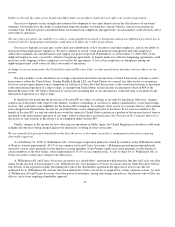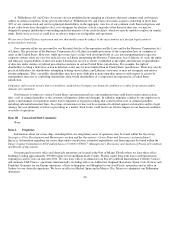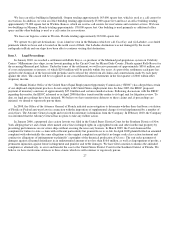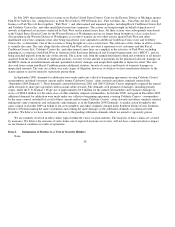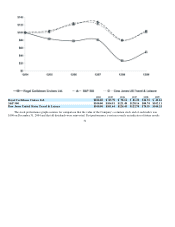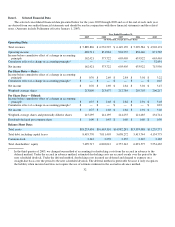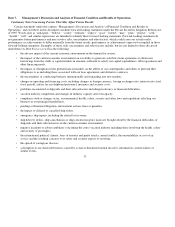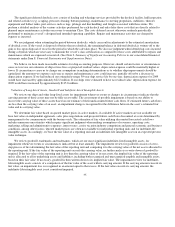Royal Caribbean Cruise Lines 2009 Annual Report Download - page 35
Download and view the complete annual report
Please find page 35 of the 2009 Royal Caribbean Cruise Lines annual report below. You can navigate through the pages in the report by either clicking on the pages listed below, or by using the keyword search tool below to find specific information within the annual report.
Failure to develop the value of our brands and differentiate our products could adversely affect our results of operations.
Our success depends on the strength and continued development of our cruise brands and on the effectiveness of our brand
strategies. Our brands have the ability to expand and target the markets in which they operate which is critical to increasing our
customer base. Failure to protect and differentiate our brands from competitors throughout the vacation market could adversely affect
our results of operations.
The loss of key personnel, our inability to recruit or retain qualified personnel or disruptions among our shipboard personnel due to
strained collective bargaining relationships could adversely affect our results of operations.
Our success depends, in large part, on the skills and contributions of key executives and other employees, and on our ability to
recruit and retain high quality employees. We must continue to recruit, retain and motivate management and other employees
sufficient to maintain our current business and support our projected growth. Furthermore, as of December 31, 2009, 80% of our
shipboard employees were covered by collective bargaining agreements. A dispute under our collective bargaining agreements could
result in a work stoppage of those employees covered by the agreements. A loss of key employees or disruptions among our
shipboard personnel could adversely affect our results of operations.
A
change in our tax status under the United States Internal Revenue Code, or other jurisdictions, may have adverse effects on our
income.
We and a number of our subsidiaries are foreign corporations that derive income from a United States trade or business and/or
from sources within the United States. Drinker Biddle & Reath LLP, our United States tax counsel, has delivered to us an opinion,
based on certain representations and assumptions set forth in it, to the effect that this income, to the extent derived from or incidental
to the international operation of a ship or ships, is exempt from United States federal income tax pursuant to Section 883 of the
Internal Revenue Code. We believe that most of our income (including that of our subsidiaries) is derived from or incidental to the
international operation of a ship or ships.
It should also be noted that the provisions of Section 883 are subject to change at any time by legislation. Moreover, changes
could occur in the future with respect to the identity, residence or holdings of our direct or indirect shareholders, or relevant foreign
tax laws, that could affect our eligibility for the Section 883 exemption. Accordingly, there can be no assurance that we will continue
to be exempt from United States income tax on United States source shipping income in the future. If we were not entitled to the
benefit of Section 883, we and our subsidiaries would be subject to United States taxation on a portion of the income derived from or
incidental to the international operation of our ships, which would reduce our net income. See Taxation of the Company above for a
discussion of such taxation in the absence of an exemption under Section 883.
Finally, changes in the income tax laws affecting our operations in Malta, Spain, the United Kingdom or elsewhere could result
in higher income taxes being charged against our operations, resulting in lower net income.
We are controlled by principal shareholders that have the power to determine our policies, management and actions requiring
shareholder approval.
As of February 12, 2010, A. Wilhelmsen AS., a Norwegian corporation indirectly owned by members of the Wilhelmsen family
of Norway, owned approximately 20.1% of our common stock and Cruise Associates, a Bahamian general partnership indirectly
owned by various trusts primarily for the benefit of certain members of the Pritzker family and a trust primarily for the benefit of
certain members of the Ofer family, owned approximately 15.5% of our common stock. A sale of shares by A. Wilhelmsen AS. or
Cruise Associates could cause a drop in our share prices.
A. Wilhelmsen AS. and Cruise Associates are parties to a shareholders’ agreement which provides that they will each vote their
shares for the election of four nominees of A. Wilhelmsen AS., four nominees of Cruise Associates and our Chief Executive Officer.
Our Articles of Incorporation require that during the term of the shareholders agreement the approval of at least one director
nominated by A. Wilhelmsen AS. and one director nominated by Cruise Associates is required for certain corporate actions. As such,
A. Wilhelmsen AS and Cruise Associates have the power to determine, among other things our policies, the persons who will be our
officers, and actions requiring shareholder approval.
25



